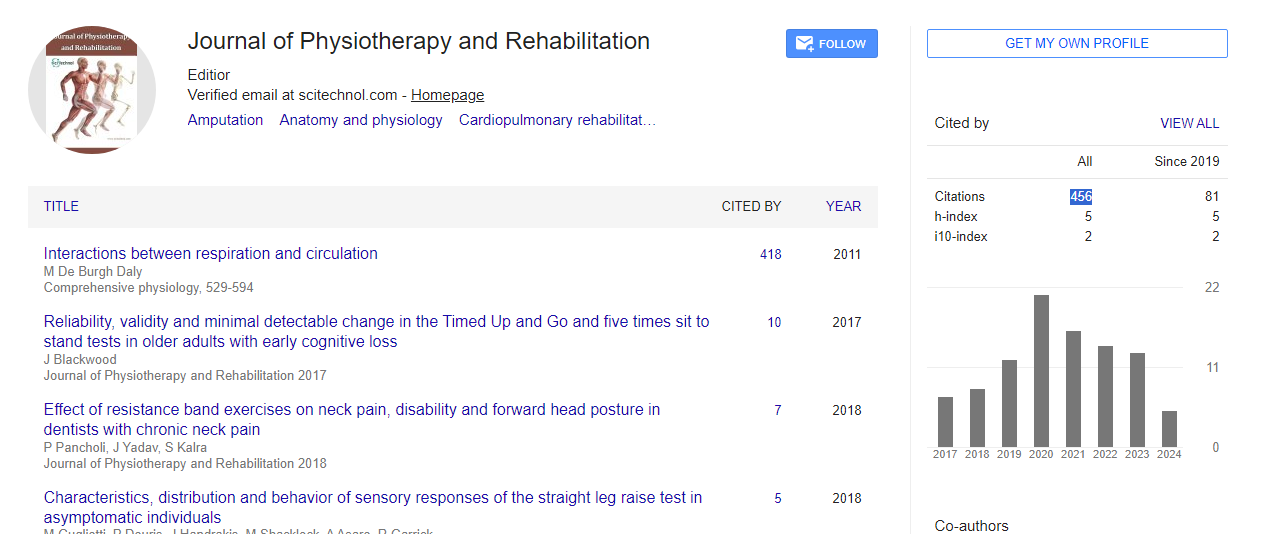Commentary, J Physiother Rehabi Vol: 8 Issue: 1
Physiotherapy Across the Lifespan: From Pediatrics to Geriatrics
Sze Eric*
1Peninsula Clinical School, Monash University, Melbourne, Victoria, Australia
*Corresponding Author: Sze Eric,
Peninsula Clinical School, Monash University,
Melbourne, Victoria, Australia
E-mail: sze-ec@p.edu
Received date: 02 January, 2024, Manuscript No. JPTR-24-134583;
Editor assigned date: 04 January, 2024, PreQC No. JPTR-24-134583 (PQ);
Reviewed date: 18 January, 2024, QC No. JPTR-24-134583;
Revised date: 26 January, 2024, Manuscript No. JPTR-24-134583 (R);
Published date: 02 February, 2024, DOI: 10.4172/JPTR.1000155.
Citation: Eric S (2024) Physiotherapy Across the Lifespan: From Pediatrics to Geriatrics. J Physiother Rehabi 8:1.
Description
Physiotherapy, a foundation of rehabilitative medicine, traverses the entire spectrum of human life. From the tender age of infancy to the golden years of old age, physiotherapists wield their expertise to enhance mobility, alleviate pain, and optimize function. In this article, we commence on a journey through the lifespan, exploring the indispensable role of physiotherapy in promoting health, wellbeing, and independence across different stages of life.
In the field of pediatrics, physiotherapy serves as a sign of hope for children facing developmental challenges. From congenital conditions like cerebral palsy and spina bifida to developmental delays and musculoskeletal disorders, pediatric physiotherapists employ a repertoire of techniques to serve optimal growth and development. Early intervention is key, as physiotherapists work tirelessly to improve motor skills, enhance mobility, and facilitate participation in daily activities. Through play-based interventions, parental education, and collaboration with multidisciplinary teams, physiotherapists empower children and families to navigate the challenges of childhood with flexibility and determination.
During the tumultuous years of adolescence, physiotherapy plays a pivotal role in promoting physical flexibility and preventing sportsrelated injuries. With the surge in youth sports participation, physiotherapists are at the forefront of injury prevention and rehabilitation. Through tailored exercise programs, biomechanical assessments, and education on proper training techniques, physiotherapists equip adolescents with the tools they need to stay healthy, active, and injury-free. Whether recovering from a sprained ankle or preventing overuse injuries, physiotherapy empowers adolescents to pursue their athletic passions with confidence and vigor.
In adulthood, physiotherapy takes on a multifaceted role in managing chronic conditions, facilitating recovery from injuries, and restoring optimal function. From musculoskeletal disorders like back pain and osteoarthritis to neurological conditions such as stroke and multiple scleroses, physiotherapists employ a comprehensive approach to care. Through a combination of exercise therapy, manual techniques, modalities, and patient education, physiotherapists empower adults to take control of their health, manage symptoms, and improve quality of life. Whether regaining strength after surgery or managing chronic pain, physiotherapy serves as a sign of hope for adults seeking to reclaim their independence and vitality.
As individuals age, physiotherapy assumes a critical role in promoting healthy aging, preventing falls, and preserving independence. Geriatric physiotherapists specialize in addressing agerelated changes such as muscle weakness, balance impairments, and mobility limitations. Through tailored exercise programs, gait training, home modifications, and fall prevention strategies, physiotherapists empower older adults to live life to the fullest. By enhancing strength, improving balance, and optimizing mobility, physiotherapy enables older adults to remain active, engaged, and independent in their communities, thereby enhancing their overall well-being and quality of life.
Conclusion
Physiotherapy transform the boundaries of age, embodying a lifelong commitment to health, well-being, and independence. From the innocence of childhood to the wisdom of old age, physiotherapists stand as beacons of compassion, dedication, and expertise, guiding individuals through every stage of life with grace and resilience. Through their unwavering commitment to promoting mobility, alleviating pain, and restoring function, physiotherapists empower individuals to overcome physical limitations, embrace life's challenges, and thrive in the journey of life. As we traverse the lifespan, let us recognize the invaluable contributions of physiotherapy in nurturing health, fostering resilience, and enhancing quality of life for individuals of all ages.
 Spanish
Spanish  Chinese
Chinese  Russian
Russian  German
German  French
French  Japanese
Japanese  Portuguese
Portuguese  Hindi
Hindi 